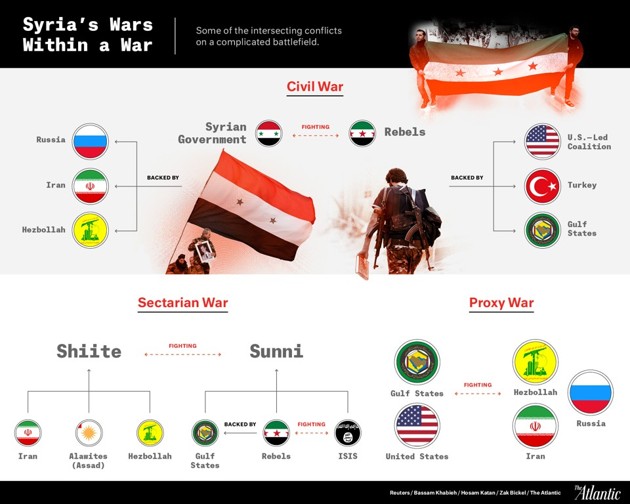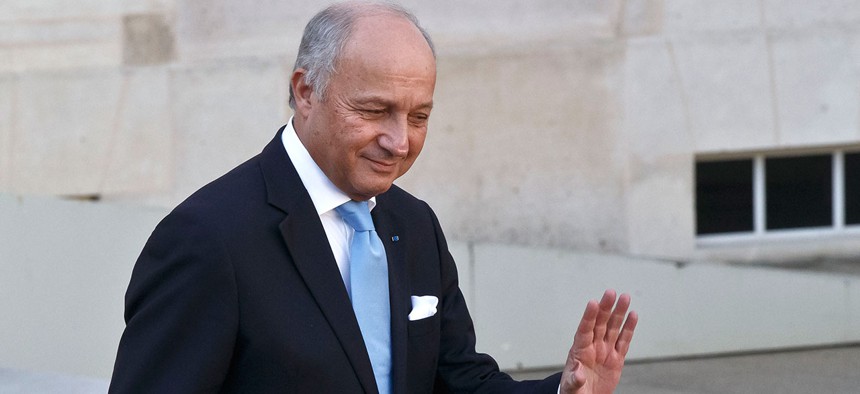U.S. Syria Policy Is Under Fire From Allies
The French foreign minister called Washington’s approach ambiguous while Turkey’s president accused it of siding with terrorists.
Allies of the U.S. role in the Syrian Civil War are criticizing Washington’s approach, even as Russian airstrikes continue to bombard the city of Aleppo in support of President Bashar Assad, who remains firmly in office nearly five years after the fighting began.
Criticism of the U.S. came from Laurent Fabius, the French foreign minister who is leaving his post to head the country’s constitutional court, as well as Recep Tayyip Erdogan, the Turkish president. France and Turkey, along with the U.S., oppose Assad’s regime and support some of the rebel groups fighting the Syrian president.
“There are the ambiguities including among the actors of the coalition. ... I’m not going to repeat what I’ve said before about the main pilot of the coalition,” Fabius said in Paris. “But we don’t have the feeling that there is a very strong commitment that is there.”
Fabius has advocated—and President Francois Hollande had supported—a more muscular French foreign policy, including backing Assad’s ouster. He was a critic of the U.S. failure to oust the Syrian leader after the use of chemical weapons despite President Obama’s previous warnings the use of such weapons would constitute a “red line.” Fabius on Wednesday said he didn’t expect the U.S. to change its policy anytime soon—despite pressure on it to act.
“I don’t think that the end of Mr Obama’s mandate will push him to act as much as his minister (John Kerry) declares,” he said.
His comments came as Syrian forces, backed by Russian warplanes, continued to bomb the rebel-held city of Aleppo. The military offensive has prompted tens of thousands of people to seek refuge at the Turkish border. Turkey, which is already the largest recipient of Syrians fleeing the civil war, is reeling from the numbers it is hosting, and is tending to those fleeing Aleppo on the Syrian side of the border—a decision for which it has been criticized by the UN and others.
The Syrian civil war pits Assad against a coalition of rebel groups ranging in politics from moderate to Islamist. Assad is backed by Russia, Iran, and Hezbollah, the Shiite militant group, who are working to keep him in power. Some of the rebels are backed by the U.S. and its allies, including Turkey. Their stated goal is a Syria without Assad. Both sides are, meanwhile, fighting ISIS, which controls territory across the Syria-Iraq border, and is now making inroads in Libya.

But diplomatic efforts to bring the various factions together have been stymied by the campaign in Aleppo, and the battle against ISIS now appears to be atop Washington’s list of priorities in the region. To this end, the U.S. has enlisted a number of groups to fight against the Sunni militant organization. Among these the most effective have been Kurdish fighters—both in Iraq and Syria. Some of these fighters belong to Syria’s Democratic Union Party (PYD). PYD has close ties to the Kurdistan Workers Party (PKK), which operates in Turkey, and which Ankara views as a terrorist group.
In remarks in Ankara on Wednesday, Recep Tayyip Erdogan, the Turkish president, lambasted the U.S. support for PYD.
“Are you on our side or the side of the terrorist PYD and PKK organization?” he asked at a speech to provincial officials. He said Washington’s policies had turned the region into a “sea of blood.”
Turkey fears that gains made by the PYD fighters on the Syrian side of the border will embolden its own restive Kurdish population. Washington maintains it does not view PYD as a terrorist group.
In other coalition news, Canada said this week it would stop its airstrikes in Syria and Iraq on February 22 in line with a campaign promise made by then-candidate Justin Trudeau, who is now the prime minister. Canada contributed six planes to the effort. The government will, however, keep two surveillance planes in the region and increase effort to train Kurdish troops in northern Iraq.



